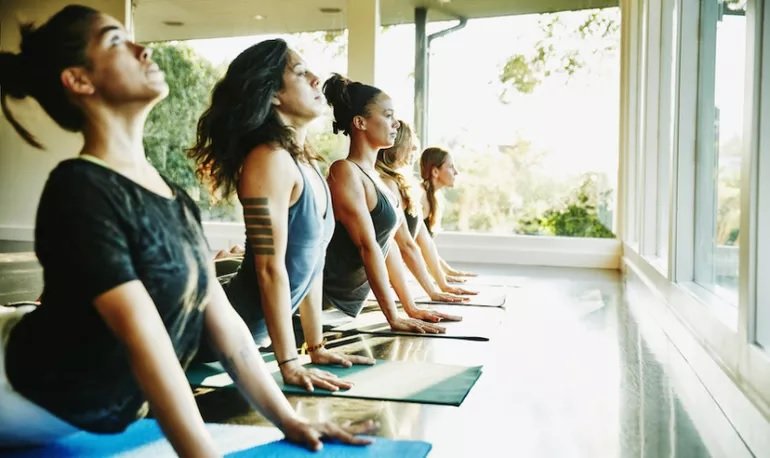
Health and wellbeing have become ingrained into our daily lives. Yoga pants are the new jeans, Fitbit is the new watch, and strong is the new sexy. Health is a status symbol which connotes quality of life and the education, money and time to spend looking after yourself.
Millennials have been at the helm of much of the popular transformation we see in modern health and wellbeing. While the 80’s were about money, aerobics and diets, there has been a distinct shift recently to values of paring back, mindfulness and equanimity.
Less talked about are elements of community, socialising and experientialism in contemporary health, fitness and wellbeing practices. These are offerings to which Millennials are flocking.

Saying goodbye to competition
As Millennials have grown up, so has the professionalisation of sports. The ability to gain incredible wealth and fame through high performance has altered how sports is approached at the school and community level, and experts have noted that the focus on high performance is creating a rift that (together with the many other recreational alternatives at hand today) is driving younger athletes away.
Many of us exist happily outside the elite athlete tier, and Millennials have heightened the social aspects of their sports and fitness endeavours and lowered those around competitiveness and winning, making pure enjoyment and accomplishment as a team a huge drawcard. What’s important is that they took part, not how fast they went.
That’s not to say the desire for individual progress doesn’t exist, but the motivation is intrinsic rather than extrinsic – more about quiet, personal goals (meeting the step quota on my Fitbit) than about loud recognition.
It has also been suggested that Millennials’ parents, the most hands-on parenting generation ever, praised and protected their children so much, that Millennials have difficulty facing failure, and choose to turn away competitive elements.
Tough Mudder, an extreme obstacle course that involves mud, pools of ice, and even electric shocks, operates under the overarching principles of teamwork and overcoming fears. Neither individual nor team times are posted; the onus is on finishing. 95 percent of people enter as part of a team and in five years it has grown into a US$100 million business.
Likewise, The November Project, a three morning a week free Boston-based running club insists their members hug on arrival, as hugs function as equalisers and icebreakers. Workouts are not segregated by ability, like traditional running clubs. The November Project grew from two guys in Boston to multiple states in just three years. They build community through verbal accountability (encouraging and motivating words) and social media – a life beyond the workout. Boston numbers rarely drop under one hundred on any morning and communications take place solely through social media.

Everything is experience
Tellingly, races like Tough Mudder and its less tough counterparts like the vibrant Colour Run (which also eschews participants times and placings) are billed as events, rather than races. They count as experiences, not marathons. And for a generation that values experience over materialism, this is key to the types of fitness that excite them.
Millennial enthusiasm for experiences can be seen in the booming festival industry. In the US, nearly half of those who attended at least one music festival was a Millennial. Wanderlust, a festival with a combination of yoga, music and food was the perfect, timely culmination of three Millennial loves. This small festival originating in the Squaw Valley has grown to the world’s largest multi-day yoga festival with international offshoots, including New Zealand. Capturing these experiences is just as important.
SoulCycle, an indoor cycling spiritual fitness phenomenon, fully embraces the experiential element. “Our one of a kind, rockstar instructors guide riders through an inspirational, meditative fitness experience that’s designed to benefit the body, mind and soul. Set in a dark candlelit room to high-energy music, our riders move in unison as a pack to the beat and follow the signature choreography of our instructors. The experience is tribal. It’s primal. It’s fun.” – SoulCycle
This description may make some guffaw and others marvel at the marketing spin, but the experience has been impactful enough for SoulCycle to have garnered a cult following that earned them close to US$100 million in 2015.

Mind the gap
Beyond the experiential element, SoulCycle, Wanderlust and Project November are providing the community a sense of belonging that can be hard to find today. Health, fitness and wellbeing is filling a physical and, with traditional religion waning, spiritual space.
“Our riders say it’s changing their lives. With every pedal stroke, our minds clear and we connect with our true and best selves. Through this shared SOUL experience, our riders develop an unshakeable bond with one another. Friendships are made and relationships are built. In that dark room, our riders share a Soul experience.” – SoulCycle
There are plenty of classes that bring community and experientialism down to a neighbourhood level – your local gym, Zumba class or yoga studio. An increasing number of dance experiences like No Lights No Lycra and Shut up and dance that bring the freedom and enjoyment of the festival atmosphere back to a weekly, local, non-pretentious level. Tough Mudder now has Half Mudders to attract the less hardcore and those less inclined to train, as well as a mud-free Urban Mudder for those who won’t leave the city.
It’s important to understand the nuances of every distinct generation. Tracking the evolution of cultural currents, layering them and understanding how they influence and are influenced by people through immersive ethnographic research such as The Listening Project provides us with this incredibly deep insight into what drives people, whatever the category. Planning for the Listening Project 4: Gen Z is underway, where we look forward to understanding how the generation after Millennials approach health and wellbeing as they come of age.




